- Home
- Sam Siciliano
The Angel of the Opera Page 7
The Angel of the Opera Read online
Page 7
“Any time, Monsieur Holmes, any time. Ask my little Meg at the Opera or any of the girls. They all know me and my little house on the Rue des Infirmes.”
“Good day, Madame Giry.”
The old woman’s face formed a smile which I would not have thought possible a few minutes earlier, then she left.
I closed the door behind her, then turned to Holmes. “You have certainly made a friend for life.”
“I hope so. A good-hearted woman such as she can be invaluable in a case such as this. No doubt she knows every bit of gossip in the entire Opera.”
“Ah, so that explains your behavior.”
Holmes frowned. “Not in the least. I liked her. Come, we are late. If we are to join the Viscount on his trip on Saturday, only two days remain this week to explore the Opera.”
For our first day, a Monsieur Bossuet was our guide. He was about my age, around thirty, but already he managed the Opera’s technical facilities: the lighting, gas, stage machinery, etc. As a trained engineer, he hit it off immediately with Holmes.
We began on the stage, which at over one thousand feet in width was the largest in the world. The carpenters were taking a short break from assembling the village set, and as the three of us walked across the stage, our footsteps echoed faintly. Its sheer size overwhelmed me. Overhead, I could dimly see countless ropes and hanging horizontal rods, then an impenetrable darkness. Impossible to tell how high the roof was. Out before us was the auditorium, everything red and gold. Above the main floor were five balconies, each sweeping about in a U. The pillars rising toward the dome were gilded, and the box fronts were all velvet and gilding.
I stopped, then took a few tentative steps forward toward the footlights. Briefly I imagined people filling the balconies and ground floor, all of them staring at me. A singer would need to face the crowd, then manage somehow to open her mouth and fill that hall with sound. It seemed humanly impossible from where I stood, but I knew it could be done. Nevertheless, merely thinking about all those eyes watching made me uncomfortable. Something akin to a shiver worked its way up my spine.
“Fear not, Henry. You have not been cast in any of the upcoming performances.”
“Thank heavens for that.”
“Once more into the breach, dear friends!” Holmes declaimed loudly, his voice losing itself in the airy heights above us.
“Bravo, Monsieur Holmes!” Bossuet applauded. “You have the makings of a thespian, I see. I myself share your cousin’s sentiments. It is a mystery to me how anyone can perform on such a stage before so many people. However, as I was saying, the lighting system still employs gas, but the time is coming when the electricity will reign supreme. For many years we have used the electric carbon-arc to supplement the limelights, but next year we will begin to replace all the regular gaslights with the electric filament bulbs. The float of the footlights there, and the battens to the side, will be among the first.” The footlights were off, but the battens overhead were on. You could see the rubber hoses feeding them, the blue flames burning behind their protective metal screen.
Holmes pointed overhead out at the auditorium. “What of the chandelier?”
“It will be retrofitted as well. When the job is done, our patrons in the uppermost balcony will be much more comfortable. It gets devilishly hot up there, and the stale air is difficult to breathe. So many gas flames consume an enormous amount of oxygen.”
I could see the chandelier, the faint glitter of crystal and gilded metal, but it hung in shadow like some shimmery creature from the depths of the sea. I looked forward to seeing it all alight. Above it was a painting on the dome which I could not make out, but which, no doubt, partook of the grand style everywhere in evidence and included more heroic female representations of Liberty, Art, Music, etc.
“The chandelier also is the largest in the world, is it not?”
“Yes, Monsieur Holmes.”
“Venting it must require a large structure.”
“Yes, the lantern, as we call it, has several windows and is quite spectacular. The auditorium dome is copper, but the lantern supports and its sculpted masks are golden. Garnier wished to gild nearly everything on the roof, but alas, the funds ran out. You will enjoy the tour of the roof, gentlemen. It will help you understand the layout of the Opera, and the view is remarkable.”
My legs faltered; I stopped walking and took a slow deep breath.
“Are you ill, Doctor Vernier?” Bossuet was genuinely concerned. “You are so pale.”
“I am afraid,” Holmes said, “that my cousin will have to forgo the tour of the roof. He suffers from vertigo.”
“Ah, that is a pity, but I understand. The flies on either side of the stage go up many levels, and at the very top, the actors below are like tiny ants. Even I feel a bit uncomfortable, so it will be best if he remains below.”
“Yes,” I nodded. “I shall remain below.”
“Perhaps, though, we could persuade you to go up one or two levels. That is where the first limelights are situated. Have you ever seen a limelight close up, Docteur?”
“No, but...”
“Oh, but you must let me show you!” He started enthusiastically for the wings. “Pierre, Pierre, would you find old du Bœuf for us? Tell him we want a display of the limes for guests.”
I gave Holmes a look of dismay, but he only smiled.
“One caution, gentlemen. Do not say a word about electric lights to du Bœuf. He is an old man and rather set in his ways. To him electric lights are a thing of the devil. To be fair, the limelights are unique, and certain effects cannot be duplicated. We shall not replace them all.”
“It does seem sad,” I said, “that gaslighting is to be vanquished. I do hope this is not a mere fad, a rush to embrace the fashionably modern.”
Holmes turned to me abruptly. “Have you ever treated a victim suffering from massive burns?”
“Yes, I remember a small child...” I shuddered. “The pity of it is you can do almost nothing to save them, not if the burns cover most of their bodies. All you can do is give them morphine to relieve the pain, and even that does not always help much.”
“Then you will understand,” Holmes said, “why I am eager for the infernal era of gaslighting to end. Few theaters last ten years, and even if a general conflagration does not burn the building to the ground, many people are killed annually. I have seen a dancer with her costume aflame, and I shall never forget the sight. It will be a blessed day when the last gaslight in a theater is extinguished.”
“I had not thought of that,” I said weakly.
“There is also the heat and the fouling of the air,” Bossuet said. “However, safety is our main reason for making the change. There was always much talk, but it was only after l’Opéra Comique burned down that the decision was finally made. We would not want anything to happen to our magnificent Palais Garnier.”
“Have you ever visited d’Oyly Carte’s Savoy Theatre in London?” Holmes asked Bossuet. “It was completed in ’81 for performances of Gilbert and Sullivan and relies entirely upon electric lighting. The lighting is much brighter, but the theater is pleasantly cool.”
“I attended one of the first performances, Monsieur Holmes, and I also saw the Iolanthe in which battery-powered electric lights were a part of the fairies’ costumes. Ah, here you are, Monsieur du Bœuf. These two gentlemen would like to see one of your limes in action. Could you oblige us?”
“Gladly, sir.”
Du Bœuf was stooped over, his face wrinkled, two folds of flesh descending from his chin into his shirt collar. He had long white hair neatly parted and an enormous white mustache. Despite his age, he seized the metal railing of the stairway and bounded up the steps. I hesitated, then warily grasped the cold metal and started upward.
“Courage,” Holmes whispered behind me.
“Here we are, gentlemen.”
We were only about ten feet above the stage, but the floor was a metal grillwork through which one could see. It
made me think of walking on air. I looked up and saw a similar grillwork above, then another beyond the first. I shuddered. Lord knew how many levels there were! Ten feet I could endure so long as I stayed back from the rail, but I dared go no higher.
Du Bœuf pointed to a wooden box about a foot square which was clamped to the railing. It had two thin rubber hoses trailing from the back. “Here’s a fine old lime. She’s lined with metal on the inside, but made of wood so she doesn’t get too hot to handle. The hole here in front is where the beam comes out, and these turncocks in back adjust the flow of oxygen and hydrogen. Shall we light her up, Monsieur Bossuet?” The elderly du Bœuf’s voice had the enthusiasm of a small boy.
“By all means, Monsieur du Bœuf.”
Du Bœuf withdrew a string with tiny white cylinders threaded upon it from his leather apron. “Here’s the limes, gentlemen. They have to be drilled right through the center, or the light is uneven. They have wax on them to keep them from breaking up, but it’s still best not to touch them. They can burn you.” He used a pair of metal tongs to withdraw a cylinder from the string. The back of the box was open, and very carefully, he set the one-inch cylinder onto a spindle inside, near the front opening.
“Lime, common quicklime,” Bossuet said, “as you two gentlemen surely know, is calcium oxide.”
“I remember that from my university chemistry class,” I replied.
Holmes’s mouth twitched. “Yes, yes. It is derived generally from heating limestone, calcium carbonate.”
Du Bœuf struck a match on the bottom of his boot, twisted one of the turncocks, then touched the match to the gas jet. The flame caught with a whoosh. “First we give it some hydrogen and let her warm up the lime for a minute or so, and we turn this here metal knob at the back, which turns the spindle round and round.”
The burning lime at first gave off a yellowish light, but gradually changed color. “There she goes. You wait until she turns red.”
“That happens when the calcium begins to be consumed,” Holmes said.
“Look at that!” Du Bœuf smiled at the reddish light glowing off the metal inside the box. “Now watch what happens when we gives her some oxygen, just watch!”
He had stopped turning the lime cylinder. He twisted the turncock to the other hose, then tipped the box all the way back so we could see the lime disk through the projection hole. A thin metal pipe curved around in front of the spindle; from it came the gas jet. The character of the flame changed, and then upon the reddish cylinder appeared a luminescent white dot. It did not really grow much in size, but the intensity of the light made it appear to swell, the color a dazzling white. I blinked my eyes and stepped back. White light from the box shot upward, hurling a great beam into the darkness above.
“There she goes!” Du Bœuf tipped the box forward toward the stage, then turned the small metal knob. “We have to give her a turn once in a while. You want the lime disk to burn down evenly, little by little. In the old days you had to turn the lime by hand, and that was tricky, believe me. Gloves always get in your way, but you can burn yourself well without them. This knob and those gears really do a neat job. It’s a pretty light, isn’t it, gentlemen?”
We all nodded, and Holmes said, “Indeed it is.” The box cast an oval of white light upon the stage floor.
“Yes sir, this is your basic limelight. You can put a lens in front and get an even tighter beam. We use them that way for a follow spot. Hand me one of the glass squares, Monsieur Bossuet.”
“Which color?”
“How about a nice orange?” Du Bœuf continued to give the knob a tiny turn every so often; he must have done this for so long that it had become an unconscious reflex upon his part. “Here’s what we do when Monsieur Mephistopheles makes his entrance.”
The orange square of glass had a metal frame; he slid the square into a holder in front of the box. Immediately the light became a lurid red orange. A carpenter walking past gazed up at us, his blue jacket changed to black, his skin an impossible shade. He had a beard, and when he smiled up at us, he did appear rather diabolical.
Holmes gave an ironic smile. “I recall some music critic saying that it was his unfortunate fate to spend much of his life at mediocre performances of Faust gazing upon the devil bathed in reddish limelight.”
Du Bœuf’s white eyebrows sank down and inward, a ready crease appearing. “Nothing mediocre about our limes.”
“No, of course not, Monsieur du Bœuf.” Holmes glanced at Monsieur Bossuet. “Nor with your Mephistopheles either.” Bossuet’s amused expression made it clear he was not so quick to take offense.
“It certainly is bright,” I said.
“It was first used for surveying,” Holmes said. “A Lieutenant Thomas Drummond employed the first limelight in 1825 while the royal engineers were surveying Ireland. The light on a mountain top could be viewed from sixty miles away. Of course, as he was interested in portability, he used a spirit lamp rather than hydrogen. It is an acceptable substitute, but an inferior one. The oxyhydrogen flame is the hottest known to man.”
Bossuet’s brow grew more and more wrinkled during this disquisition, while du Bœuf’s jaw gradually dropped. Finally the old lime man spoke. “You are very learned, sir. I never met anyone else besides an old limer or two like myself who had heard of Drummond.” No minister citing chapter and verse ever received a more devoted gaze than Holmes received from the old man.
“Chemistry interests me, as do light and fire. Several orange limes are used to simulate great conflagrations on stage, are they not? I saw quite a spectacular display last year in which an entire house was on fire, the walls and floors giving way.”
“Quite right, sir! I’ve done many a fire scene in my day. There’s always a number of ladies that faint dead away and many gentlemen that come out in a sweat.”
Holmes had found another friend, and he, du Bœuf, and Bossuet could no doubt have discussed stage lighting all day. However, Holmes at last reminded them of his schedule, and he and Bossuet ascended higher while I gladly returned to the stage floor.
When they came down an hour later, Holmes told me they had climbed all the way to the roof. At every level were lights, both limes and the electric carbon-arc variety. Some six levels up Holmes had come upon a row of gigantic bells; they were used for rousing climaxes, battles and triumphs, and church scenes. The view from the roof was spectacular, the copper dome weathered green, a statue of Apollo with a golden lyre situated at the highest point of the Opera.
During the afternoon Bossuet showed us the backstage area, which was as large as the stage itself. We saw completed sets for current productions. Three-dimensional building fronts, trees, etc., made of cardboard or papier-mâché had become the rage, supplementing the flat painted scenes. However, dozens of conventional backdrops hung high overhead, the building having been designed so they could be stored unfurled above the stage.
In a room nearby I saw several peculiar machines which resembled strange three-barreled weapons. These were the “magic lanterns” used to project various scenes from glass slides. Bossuet told us the lanterns employed the limelight because of its brilliance and intensity. Each machine actually had three lanterns stacked vertically; this allowed scenes from two slides to be combined, while the third could be used for a “dissolving” effect. The gas to one light was turned down while another was turned up; one scene, a blasted heath, say, would fade away even as another took its place.
At last we saw something more to my liking: the practice room of the corps de ballet. The girls were very young, lithe, and slender, and they leapt about with great energy. All wore white tights and white dresses with skirts of transparent gauze. I had not realized how much physical stamina dancing required. One could see powerful muscles in the girls’ slim legs.
“Who is that man in the astrakhan hat?”
I was barely aware that Holmes had spoken. I turned my head and saw him staring at a man in the opposite corner of the room. He was wearing a f
ez made of black astrakhan wool, but what struck me was his villainous face. Although I, too, had been watching the dancers intently, I hoped I had displayed no such leering lasciviousness as he.
“That is the Persian,” Bossuet replied.
“Which Persian?”
“I do not know his name. He is only referred to as the Persian. He is a frequent spectator at the Opera. He is an acquaintance of Richard or Montcharmin, and they have given him ready access to the Palais Garnier.”
“I do not much care for his face,” I said. “Nor his hat.”
At that moment the piano player came to the end of the piece. “Five minutes, girls,” shouted the dance master. We strolled leisurely toward the door, but we were suddenly confronted by one of the dancers.
She was a short, slight thing with a pale face, large, luminous brown eyes, and black hair. Her hair was bound up in the same bun as the other dancers. Her forehead was damp with perspiration, and her nostrils flared as she tried to control her breathing.
“Monsieur Holmes? Monsieur Sherlock Holmes?” Her voice was little more than a whisper, and she spoke without hardly opening her mouth.
“Yes, Mademoiselle?”
“My mother... I am Meg Giry. My mother... You are not... angry?”
“Not in the least, Mademoiselle. We had a pleasant conversation this morning upon a subject of mutual interest, the Opera Ghost.”
Mademoiselle Giry gave us a look of total incredulity. “She did not...? You are not...?”
“A charming woman. She does possess strong opinions, but I admire that in a woman.”
Her incredulity changed to relief. “Merci, Monsieur. Merci beaucoup.” She gave us a brief smile that revealed brown, diseased teeth; then, instinctively, she closed her mouth. She nodded, mumbled, “Merci,” again, then turned and walked away. Her white dress came halfway up her back; the top of her shoulder blades were revealed and the slender white nape of her neck. “I see, Henri, that I shall have to return you to Michelle quickly ere you run off with some youthful artistic denizen of the Opera.”

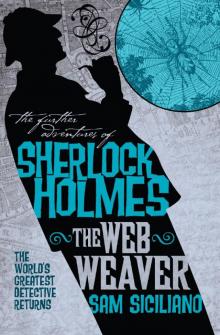 The Web Weaver
The Web Weaver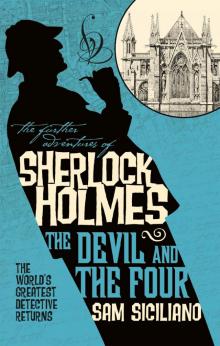 The Further Adventures of Sherlock Holmes--The Devil and the Four
The Further Adventures of Sherlock Holmes--The Devil and the Four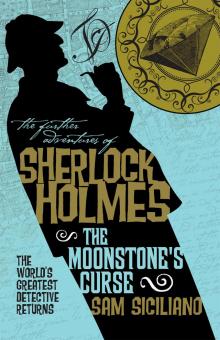 The Moonstone's Curse
The Moonstone's Curse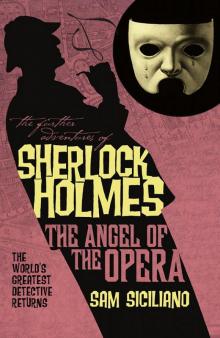 The Angel of the Opera
The Angel of the Opera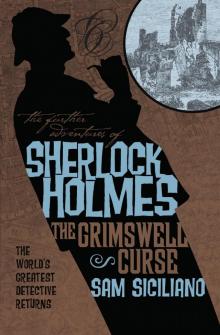 The Grimswell Curse
The Grimswell Curse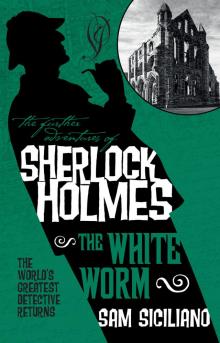 The White Worm
The White Worm